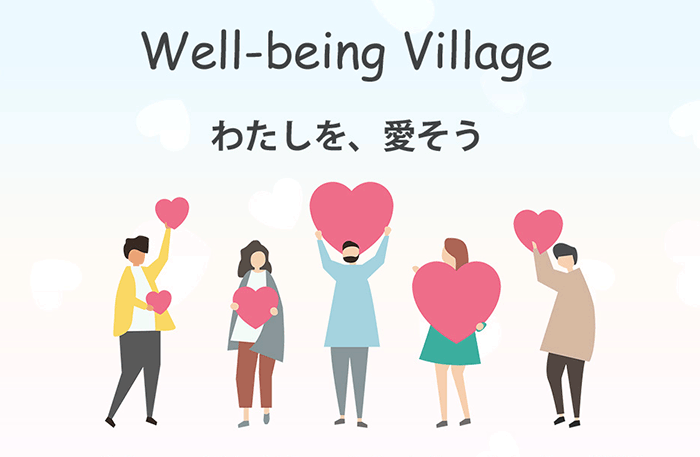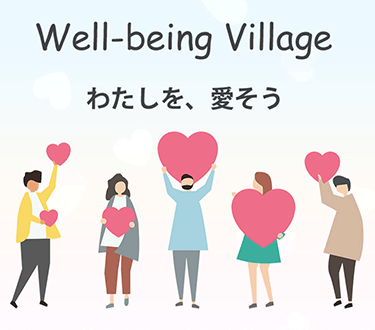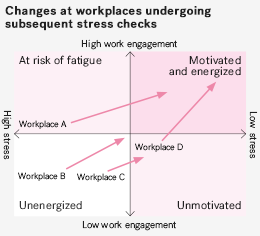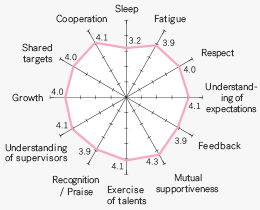Well-Being Management Co-Creating Happiness for People and Society
Well-Being Energization
MARUI GROUP is stepping up well-being initiatives aimed at energizing employees. These initiatives focus on energizing and empowering employees to increase productivity through changes in awareness and behavior in order to drive improvements in corporate value and enable greater contributions to be made to society.
Members of the official Groupwide Well-Being Management Project Team and the members of management that act in a supporting role have a central part to play in planning and implementing various well-being activities for the purpose of promoting well-being energization.
Comment from Company Physician and CWO
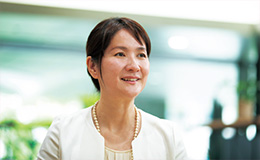
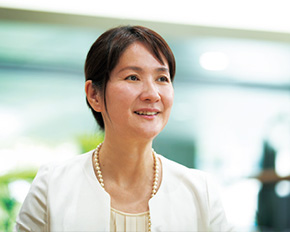
- Reiko Kojima
- Director, Executive Officer,
and CWO(Chief Well-being Officer)
General Manager,
Wellbeing Promotion Department
MARUI GROUP
- Evolution of MARUI GROUP's Business through Well-Being Management
- Our well-being management is an approach toward realizing the MARUI GROUP's overall mission of helping build an inclusive society that offers happiness to all that looks at this mission through the lens of well-being. Generally, people tend to view healthcare in terms of preventing illnesses, by drinking responsibly, for example. This image makes health seem like a personal issue. We thought to overturn this image to realize more inclusive healthcare management that helps everyone feel more energized and happier. For this reason, we began referring to healthcare management as "well-being management." The degree to which people's bodies, emotions, brains, and minds are energized will necessarily have an impact on the nature of their actions. Together with all stakeholders, both internal and external, we aim to contribute to the realization of a flourishing, sustainable society in which everyone is happy and radiant as they feel empowered in all of their activities.
Well-being as a Management Strategy for Energizing Employees
In its well-being management, MARUI GROUP believes it is important to go beyond the basic approach of preventing illness (basic health) in order to foster more energized and happy employees (well-being). We have therefore been promoting well-being management that combines these approaches. In addition, well-being management has been positioned as an important element of our strategies and is thus being practiced on a Groupwide scale through coordination between the Wellbeing Promotion Department and MARUI GROUP's health insurance union.
MARUI GROUP's Well-Being Management
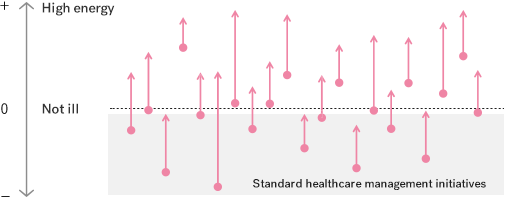
Corporate Culture of Voluntary Participation Accelerating Well-Being Activities
MARUI GROUP has prepared a plethora of training programs and open application project teams in which employees can participate on a voluntary basis. well-being activities such as the Well-Being Management Project Team and the Resilience Program are also advanced through voluntary participation. Activities led by members assembled on a voluntary basis have proved to be highly proactive. The bottom-up activities of the Well-Being Management Project Team assembled from various workplaces are supported by managerial staff members who have taken part in the Resilience Program, driving the dissemination of these activities inside and outside of the Company. By cultivating a corporate culture that encourages employees to voluntarily engage in well-being activities, MARUI GROUP looks to energize the entire organization.
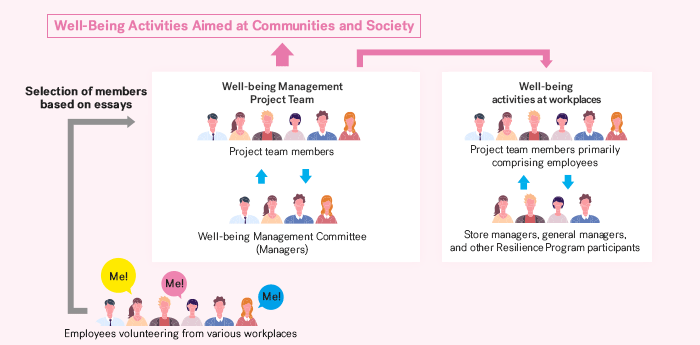
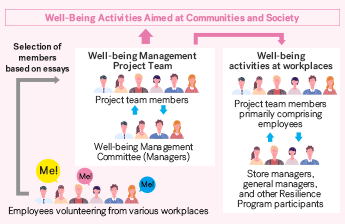
Well-Being Activities Promoted by Project Team Members
Established in November 2016 as an official Groupwide project team, the Healthcare Management Project Team is now in its fifth year (as of May 2021). In the first year of its activities, this project team primarily focused on spreading awareness of healthcare management. The emphasis in the second year was increasing understanding of healthcare management. In its third year, this project team was renamed the Wellness Management Project Team and extended its activities to outside of the Company, and these activities continued in its fourth year. In its fifth year, the project team was renamed the Well-Being Management Project Team. Activities in this year included initiatives related to femtech and other women’s health issues and efforts for improving employee engagement.
Project team members are selected from among applicants based on essays and members are changed on an annual basis, producing a new set of autonomous employees with increased knowledge and awareness each year. These employees play a central role in promoting well-being activities throughout the Group, involving other employees in the process.
-
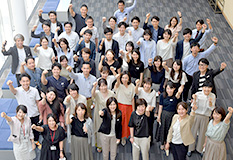
- At the beginning of each period, members leaving the project team confirm progress together with new members before passing these activities on to them
-
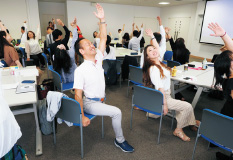
- A stretching session is held before the start of each regular monthly project team meeting in order to energize team members
-
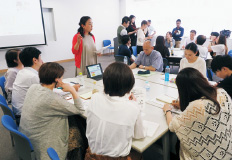
- Members act as instructors to one another on the topics of body, mood, mental state, and thinking, all important elements of health and happiness
FY2022 Initiatives: Well-being Events Examining Women's Health Issues
MARUI GROUP is encouraging a more open discussion on women’s health issues that were previously rarely talked about through such efforts as inviting femtech companies to become tenants in the concept shop section of Shinjuku Marui Main Building and arranging panel discussions with younger entrepreneurs.
Resilience Program Aimed at Senior Management
The understanding of senior management is necessary to enable employees to become more energized and empowered in their work. The Resilience Program is a one-year program that targets the officers, general managers, and chief managers that have a large influence on their organizations. In this program, managers learn habits that energize themselves and those around them to realize overall higher levels of energy, have a positive influence of those around them, and energize their entire organization.
Before the start of the program and after its conclusion, evaluations are conducted through feedback from the participants, their subordinates, and their families to analyze data on the participants' own energy levels and their influence on others. These analyses have indicated an improvement in participant energy levels after taking part in the program. As of April 31, 2022, 150 individuals had participated in the program, and these individuals are now proactively supporting internal well-being activities.
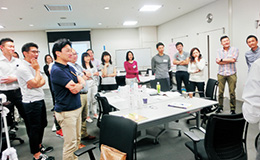
Intensive resilience training seeing participation by officers, general managers, and other managers
Influences on Workplaces
After managers have participated in the Resilience Program, improvements have been observed in the energy levels of the organizations overseen by these managers.
The graph below indicates changes in the stress check results of organizations overseen by program participants (in comparison to Companywide averages). Following participation by managers, improvements were seen in the stress rates of these organizations along with increases in work engagement indicators such as workplace motivation and respect for individuals, indicating changes in the attitudes and stances toward work of individual employees. These results demonstrate that initiatives based on the knowledge and habits gained through the program are having a positive influence on those surrounding participants.
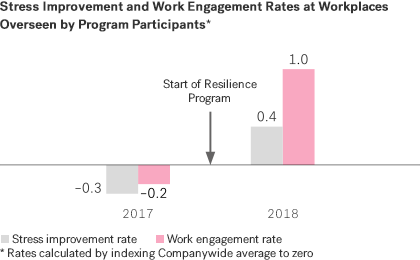
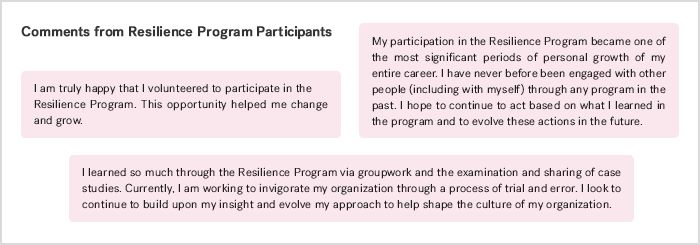
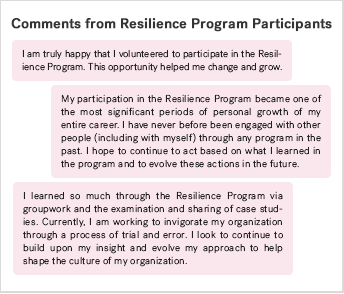
Tracking of Well-Being Activities and Organization Energy
Analyzing the benefits of well-being activities enables us to track the link between well-being activities and organization energy levels. Workplaces actively engaging in well-being activities have seen improvements in work engagement indicators, providing quantitative evidence of the link between well-being management and Companywide energy.
EXAMPLE 01Participation in Workplace Well-Being Activities by 67% of Employees
A survey conducted in June 2019 found that 67% of employees were participating in workplace well-being activities, showing that these activities are gaining traction within the organization. In addition, members of the Well-being Management Project Team conducted a survey on changes in the awareness and behaviors of project members as part of their activities in their workplaces. These surveys indicated that these activities were helping energize organizations through increases in motivation, a sense of self-efficacy, and confidence in work ability.
Participation in Workplace Well-Being Activities in Past Six Months
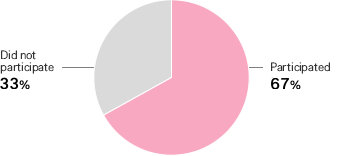
Changes in Awareness and Behaviors of Project Members
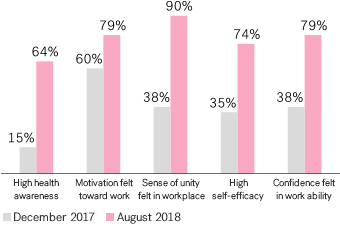
EXAMPLE 02Energization of Workplaces through Stress Checks
The results of organization analyses via stress checks are being used to institute targeted measures aimed at items identified as important for specific workplaces (items that will contribute to improve work engagement). After initial stress checks in the fiscal year ended March 31, 2019, voluntarily participating workplaces conducted additional stress checks before the end of the fiscal year. These checks found that stress was down and work engagement was up at almost all applicable workplaces. Successful measures will be shared throughout the Company in the future to energize other workplaces.
EXAMPLE 03Hybrid Measures Based on Organization Energy Surveys (Organization Health Surveys)
With the aim of further energizing organizations, MARUI GROUP has introduced proprietary organization health surveys that allow for analyses of organizations with small numbers of people, which are conducted in conjunction with stress checks. These surveys are currently being performed at more than 100 organizations. The benefits of stress checks will be used together with organization health surveys to increase the accuracy of future measures.
| Stress Checks | Organization Health Surveys | |
|---|---|---|
| Timing | Once a year, in principle | Quarterly or at other freely chosen periods |
| Aggregation method | Specialized aggregation by external partner (90 questions) | Simple aggregation at workplaces (12 questions) |
| Minimum number of participants | More than 10 | Around 10 (capable of surveying small numbers of people) |
This sustainability website is designed to accommodate people with color blindness.







